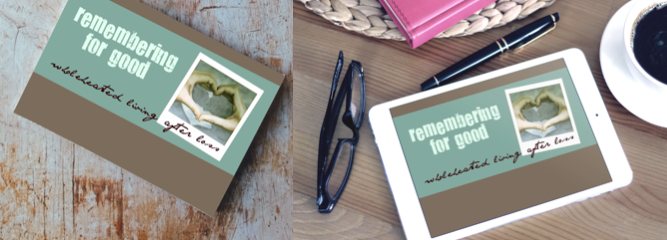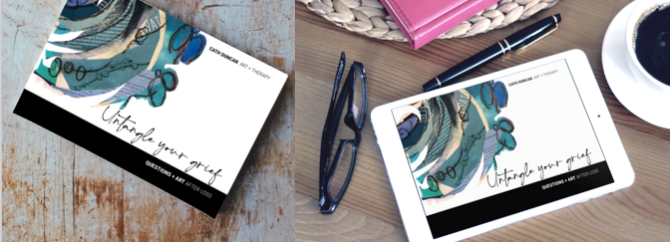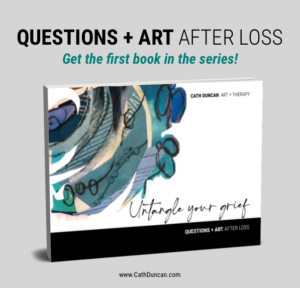In your journey of learning to live wholeheartedly after loss, if you were able to ask a fairy godmother for just one internal resource that you’d be able to receive in abundance, what would you ask for? What character trait, mindset or internal resource do you think would make the greatest difference in your journey?
My choice surprised me at first. I’d pick curiosity.
We hear people talking about needing strength, courage, love, faith, trust and a positive outlook in order to grieve and heal after loss, but I’ve never heard anyone talk about the importance of curiosity after loss. But when I look back on what’s helped me most, the internal resource and character trait that’s served me most has been curiosity.
Curiosity gave me the courage to meet and hold our daughter even though she was small and life-less. I thought I’d be devastated to see her like that, but the dominant feelings I had when we met her were love and awe.
Curiosity motivated me to be fully present and take in every last detail of what she looked like, felt like, smelled like, so that I have rich memories of her, that continue to inspire me and expand my heart.
Curiosity got me through my darkest moments by switching me over from the darkest emotions and thoughts to fascination at the way my mind, body and heart responded to our daughter’s death and the other losses we endured. I’d be swamped by sadness and hopelessness and find myself thinking, “So this is what deep sadness and hopelessness feels like… this is what my clients have told me about in the past… “ And in that moment, as I switched to observing myself and being curious, the intensity of the emotion would dissolve. That’s how curiosity taught me that I had the seemingly magical ability to transform my emotions through simple observation.
Curiosity distracted me from my pain by showing me the changing weather and foliage on my regular river walks and drawing me back daily just so I could see what had changed since my last walk.
Curiosity made me want to look at my losses through different lenses and helped me build a more complete, nuanced and balanced view, which helped me to integrate them into my sense of self more easily.
Curiosity made me wonder what all of this was for – whether there was a bigger purpose, how this would change me and my life path, and what I could create from it, which opened me to noticing, receiving and appreciating many resources, gifts and lessons alongside everything we lost.
Curiosity helped me to question the fear and shame and tricky social stories that popped up about how I “should” feel and what I “should” do as I grieved, and this gave me the freedom to grieve and remember in my own way, and to become more myself in the process.
Curiosity helped me to reach out and connect with other people who were grieving or living wholeheartedly after loss, to witness their stories and to hold space for both the shared experiences and the differences between the ways we’d experienced our grief.
Curiosity got me wondering how I’d look back on this time in my life 20 or 30 years from now, which created a sense of future and a desire to live a long life again after feeling like I was just surviving each minute and dreading the years ahead.
Curiosity motivated me to read, ask, review and dissect my whole experience of loss and grief, alongside the many stories I’d collected from other people so that I soon found myself with a rich collection of ideas, resources and tools to help me live wholeheartedly after loss and to offer to other people who were trying to do the same. Curiosity lead me to my new work purpose.
I’ve come to believe that curiosity is the super-resource for healing. Without curiosity, it’s incredibly difficult to experience the dark grieving emotions, to question your shame and free yourself to become more of the person you want to be while you grieve, to learn, to find the unexpected treasures in your trauma, to stay connected with others and to learn new mindsets and skills for living wholeheartedly after loss.
I have the good fortune of being naturally curious and in recent years I’ve enjoyed discussions with Michael Gelb (author of How To Think Like Da Vinci) and Todd Kashdan (author of Curious?) and many others who have helped me to understand the power or curiosity. Even before we lost Juggernaut, I was an evangelist for the power of curiosity, but looking back on these past 18 months, I would go so far as to say that, “curiosity saved this cat(h).”
How has curiosity served you in your grieving? Where could you invite more curiosity into your journey of learning to live wholeheartedly after loss?
Would you like guidance to explore and heal your grief?
I’ve put together a 35-page grief “workbook” for you; an introduction to Remembering For Good and living wholeheartedly after loss. Learn more about the Remembering For Good grief workbook.
The first book in the QUESTIONS + ART AFTER LOSS series, Untangle Your Grief is a beautiful 65-page book of artful questions and creativity-sparking art prompts to help you to create meaning, belonging, and hope after loss.




http://www.SchoolandUniversity.com help me find a college, Online University, Online College, Online Schools.https://www.trafficgeyser.net/lead/help-me-find-a-college